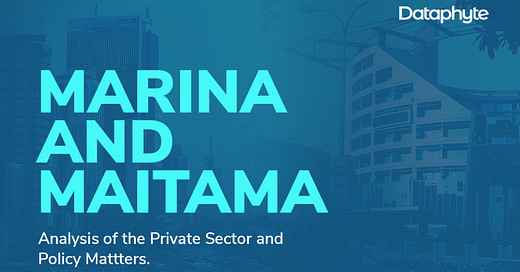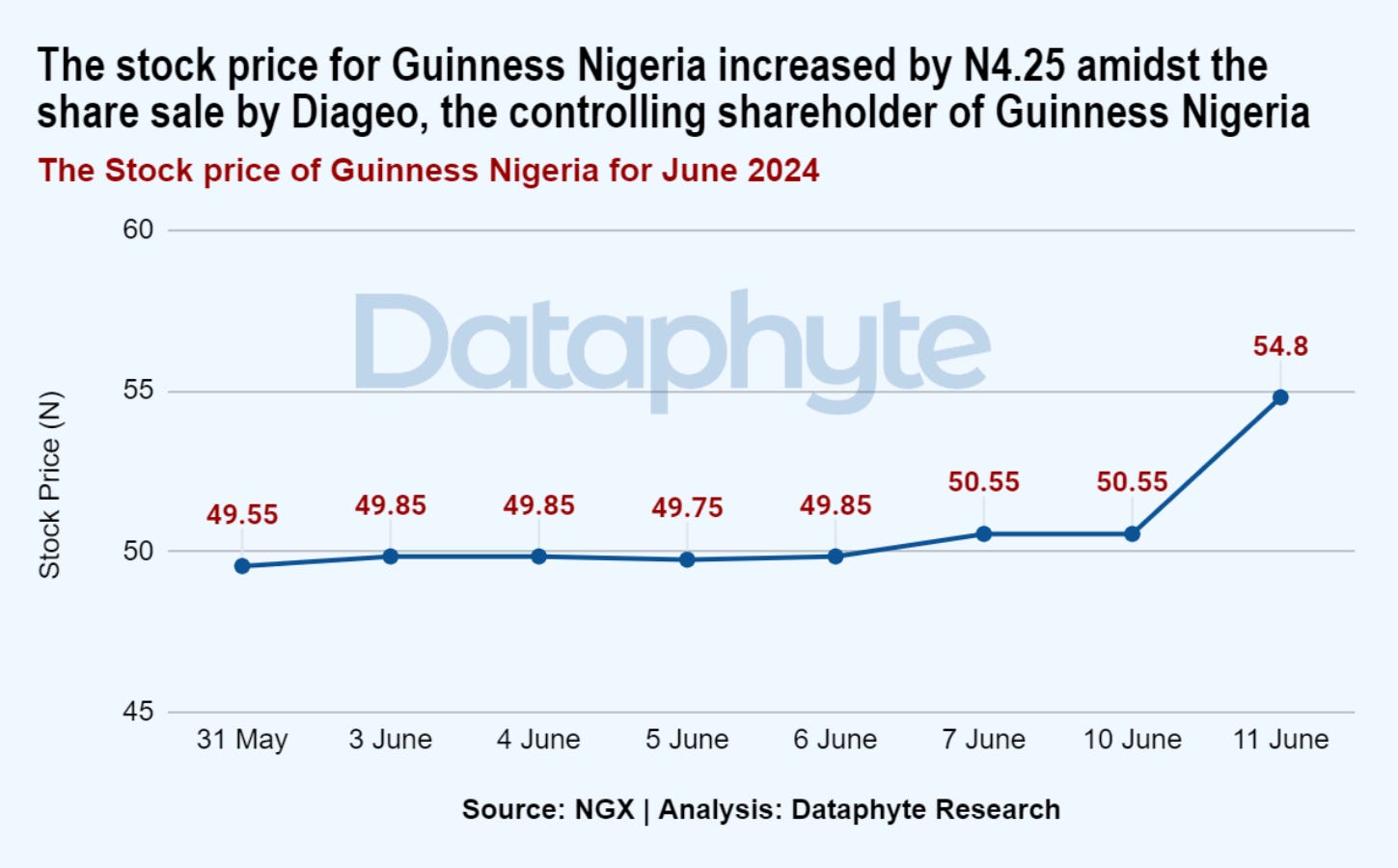8% Better: Guinness, After Diageo Exit
Diageo has announced the sale of its controlling shares in Guinness Nigeria and a new long-term partnership with Tolaram, one of the leading companies in consumer goods in Nigeria, to accelerate the growth of Guinness Nigeria.
Diageo, a “British multinational alcoholic beverage company” prides itself as a brand builder for popular liquor brands.
According to John Musunga, Managing Director/ CEO, Guinness Nigeria, the move will enable the company to better focus on its core strengths in manufacturing, marketing, and distributing of non-alcoholic drinks, beer, Ready-to-Drink (RTDs), and locally produced spirits, enhancing sustainability, growth, and value for all stakeholders.
Also, it will mitigate the negative impact of lingering foreign exchange scarcity and exchange rate volatility.
Amidst news of Diageo’s exit, Guinness's share price increased by 8.4% or N4.25 on the day of the press release.
Guinness share price opened at N50.55 and closed at N54.80 on June 11, the highest so far in the month.
In the last one year, Guinness Nigeria lost 22.5% off its price valuation and currently ranks as the 132nd on the Nigeria Stock Exchange (NGX) in terms of Year-to-Date performance.
It is currently the 30th most valuable stock on the NGX, with a market capitalization of N120 billion, accounting for about 0.213% of the Nigerian Stock Exchange equity market.
It also ranks as the 37th most traded stock on the NGX over the past three months (March 7 - June 11, 2024). It has traded a total volume of 92.5 million shares in 4,224 deals valued at N4.55 billion over the three-month period, with an average of 1.47 million traded shares per session.
Strikingly, its highest volume of stocks worth 19.6 million was traded on June 6 and its lowest volume of 43,330 was traded on May 9.
Within one year, 11 major foreign companies have stopped full operations in the country because of instability in external prices (exchange rate) and other prevailing macro-economic conditions.
Most of the companies that have left Nigeria are in the Fast Moving Consumer Goods (FMCG) sector.
Diageo maintains its presence in Nigeria by partnering with Tolaram under the new terms of a licence and royalty agreement. This partnership might be an opportunity for the next phase of growth for Guinness Nigeria.
“Today’s announcement represents a significant opportunity for the next phase of growth for Guinness Nigeria.
“This partnership brings together Tolaram’s deep expertise in manufacturing and distribution and Diageo’s exceptional capabilities in brand building and innovation,” said Omobola Johnson, Chair of Guinness Nigeria.
Tolaram will acquire 58.02% of Guinness Nigeria shares which was owned by Diageo to become the major shareholder of Guinness Nigeria.
Although Diageo will no longer be a shareholder, it retains the ownership of the Guinness brand and will licence it to Guinness Nigeria for the long term.
“Guinness Nigeria will also continue to have rights to manufacture and distribute the other Diageo brands that it currently manufactures and distributes including its Main Stream Spirits (MSS),” according to the press report by Diageo.
President Diageo Africa and Chief Commercial Officer, Dayalan Nayager, said, “We’re also very excited about the future of our international premium spirits business in Nigeria, a vibrant country to which we remain deeply committed.”
Diageo’s replacement, Tolaram, is a multinational company with 50 years of significant and extensive experience in Nigeria.
Tolaram has a diversified portfolio comprising Consumer Goods, Infrastructure, and FinTech companies in Nigeria.
50% Cheaper: CNG Conversion Kits
The Federal Government has announced a plan to subsidise the cost of Compressed Natural Gas (CNG) vehicle conversion kits by 50% for Road Transport Union members nationwide.
The goal of the Conversion Incentive program is to create a cleaner and cheaper energy option for Nigerian motorists.
Also, it aims to achieve the presidential CNG initiative of converting one million vehicles from the use of petrol to Compressed Natural Gas (CNG) before 2027.
According to the International Energy Agency (IEA), Carbon Emissions by the transport sector in Nigeria has been on the rise in the last 10 years.
Data on CO2 emissions shows that Nigeria’s transport sector emitted 57.213 million tonnes of CO2 as of 2021, the highest level of pollution in 10 years.
This might indicate that there is an increase in the number of transport vehicles using combustible energy/petroleum products in the last 10 years.
In comparison to other sectors in Nigeria, the transport sector made the most use of petroleum products and is likely to suffer the most effect in the case of a fuel price increase or scarcity.
In 2021, Nigeria ranked 38th out of 149 countries on CO2-emission from fuel combustion globally.
The country’s emissions have increased by 128% in the last 21 years.
CNG is a safer and more efficient energy source for powering vehicles than petrol and diesel, according to the National Center for Technology Management.
It is derived from compressing methane down to less than 1% of its volume. This is achieved by storing natural gas at baseline temperature and high pressure.
The CO2 emission from a CNG-powered vehicle is smaller compared to the emission from other gasoline/diesel-powered vehicles.
It can also be used to power generators, for water heating and for air conditioning.
The use of CNG will ensure access to clean and affordable energy sources to generate power for transport and other sectors of the economy.
CNG-powered vehicles also have low operational costs.
Currently, CNG is sold at N320 - N350 per comparable litre to petrol’s, while petrol is sold at above N700 per litre.
Nigeria has 8 conversion centres in 4 states of the country: Kwara, Lagos, Abuja, and Rivers.
The Conversion Incentive program aims to diminish the country's reliance on fossil fuels, thereby bolstering energy independence and contributing to a more secure energy future for Nigeria.
Nigeria is a signatory to the International climate change treaties which prioritise greenhouse gas emission reduction. This initiative will ensure we make some headway in reducing the country’s carbon footprint.
Thanks for reading this edition of Marina and Maitama. It was written by Lucy Okonkwo and edited by Oluseyi Olufemi.









